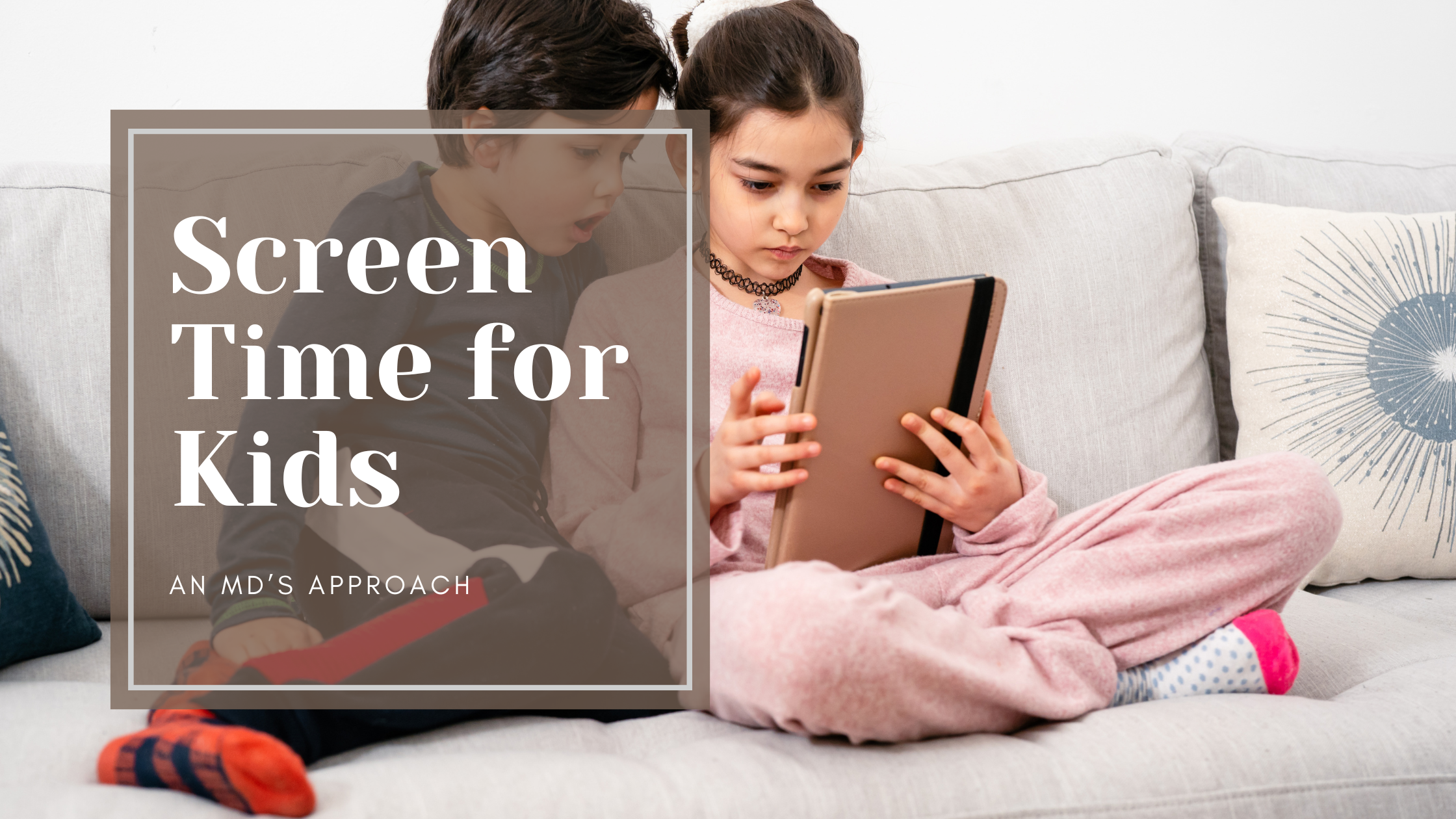Screen Time for Kids: An MD’s Guide to Raising Balanced Kids in a Digital World

Screens have become an integral part of modern family life. From educational apps to family movie nights, they provide convenience, entertainment, and learning opportunities. Yet, as an MD, I’ve witnessed the unintended consequences of excessive screen use on children’s development, behavior, and health.
This guide explores the science behind screen time for kids, practical strategies to foster healthier habits, and research-backed solutions for parents. The aim isn’t to eliminate screens but to help families use them mindfully and effectively.
The Science of Screen Time for Kids: What Does the Research Say?
Cognitive Development

Research from the NIH indicates that children spending more than two hours daily on screens tend to score lower on language and thinking tests. For toddlers, excessive screen time is associated with delayed language development and impaired executive functioning.
💡 Solution: Encourage hands-on, interactive play and limit passive screen use.
Affiliate Pick: Melissa & Doug Wooden Block Set
*”A timeless toy that fosters creativity and critical thinking.”
Physical Health

Excessive screen time for kids often correlates with decreased physical activity, contributing to obesity risks. A 2020 study published in JAMA Pediatrics found that children engaging in more than three hours of daily screen use were 30% more likely to develop sedentary habits.
🔗 Explore the JAMA Pediatrics study.
💡 Solution: Replace screen time with outdoor activities or structured exercise.
Affiliate Pick: Outdoor Scavenger Hunt Game
*”Perfect for getting kids moving while having fun.”
Sleep Disruption

Blue light emitted from screens suppresses melatonin production, delaying sleep onset and reducing overall sleep quality. A study in the Sleep Health Journal recommends reducing screen exposure at least an hour before bedtime.
🔗 Learn more from Sleep Health Journal.
💡 Solution: Create screen-free zones in bedrooms and use blue light filters during evening hours.
Affiliate Pick: Blue Light Blocking Glasses for Kids
*”A practical tool for minimizing screen-related sleep disruptions.”
The Behavioral Impact of Screen Time for Kids
Social Skills

Prolonged screen use may replace valuable face-to-face interactions essential for developing empathy and communication skills. A 2018 study published in Pediatrics found that preschoolers with over four hours of screen time daily often struggled with peer relationships.
💡 Solution: Dedicate screen-free times for family bonding activities like board games or storytelling.
Affiliate Pick: UNO Family Game Night Bundle
*”Interactive games that bring families together.”
Attention and Focus

High screen exposure is linked to attention difficulties and hyperactivity in young children, as shown in a longitudinal study by the Canadian Journal of Behavioral Science.
💡 Solution: Balance screen use with hands-on activities that promote focus and engagement.
Affiliate Pick: Time Management Cube Timer
*”A fun and simple way to teach time management.”
MD-Approved Strategies for Balanced Screen Time for Kids

1. Follow Age-Appropriate Guidelines
- Under 2: Avoid screens, except for video calls.
- Ages 2–5: Limit to one hour of high-quality programming daily.
- Ages 6+: Customize limits based on family priorities.
2. Create Screen-Free Zones
- Ban screens from bedrooms, dining areas, and cars to encourage conversations and mindful habits.
3. Prioritize Quality Over Quantity
- Opt for educational and interactive apps over passive viewing.
4. Model Healthy Habits
- Demonstrate mindful screen use by limiting your own screen time during family moments.
5. Use Tools to Support Boundaries
- Invest in timers, docking stations, and blue light glasses to reinforce limits and create a tech-positive environment.
FAQs About Screen Time for Kids

How much screen time is too much for kids?
The American Academy of Pediatrics recommends:
- Under 2 years: Avoid screens, except for video calls.
- Ages 2–5 years: Limit to one hour of high-quality programming daily.
- Ages 6+ years: Set consistent limits based on the child’s needs and family values.
What are the negative effects of excessive screen time on kids?
Excessive screen time can lead to delayed cognitive development, increased risks of obesity, sleep disruption, attention difficulties, and impaired social skills.
Can screen time be educational?
Yes! High-quality educational apps and programs can support learning when used in moderation. Interactive content is generally better than passive viewing.
How can I reduce screen time for my kids?
Start by creating screen-free zones, scheduling outdoor play, and modeling healthy screen habits yourself. Use tools like timers and parental controls to set clear boundaries.
Is it okay to use screens for calming down tantrums?
While occasional use is understandable, relying on screens as the primary soothing mechanism can make it harder for kids to self-regulate their emotions. Encourage other calming techniques like deep breathing or reading.
FAQs About Her Balanced World
What is Her Balanced World?
Her Balanced World is a blog dedicated to helping families find balance in parenting, budgeting, self-care, and RV living. We focus on providing actionable tips and relatable insights for modern families.
Who runs Her Balanced World?
The blog is run by a passionate parent and MD who shares personal experiences and expert-backed advice to help families navigate everyday challenges.
What topics does Her Balanced World cover?
We cover a range of topics, including:
- Screen time management
- Family-friendly recipes
- Budgeting tips
- RV living
- Health and wellness
Does Her Balanced World collaborate with brands?
Yes! We partner with brands that align with our mission to provide value to families. Contact us for collaboration opportunities.
How can I stay updated with Her Balanced World?
Follow us on social media or subscribe to our newsletter to get the latest tips, articles, and resources straight to your inbox.
Final Thoughts
Screen time for kids is here to stay, but with the right balance, it can be a tool for growth rather than a distraction. By following these strategies, you can make screen time a healthier and more enriching experience for your family.
Explore the tools linked above to start creating mindful screen habits today. What strategies work best for your family? Share your thoughts in the comments below!
Explore my book on this topic here!


